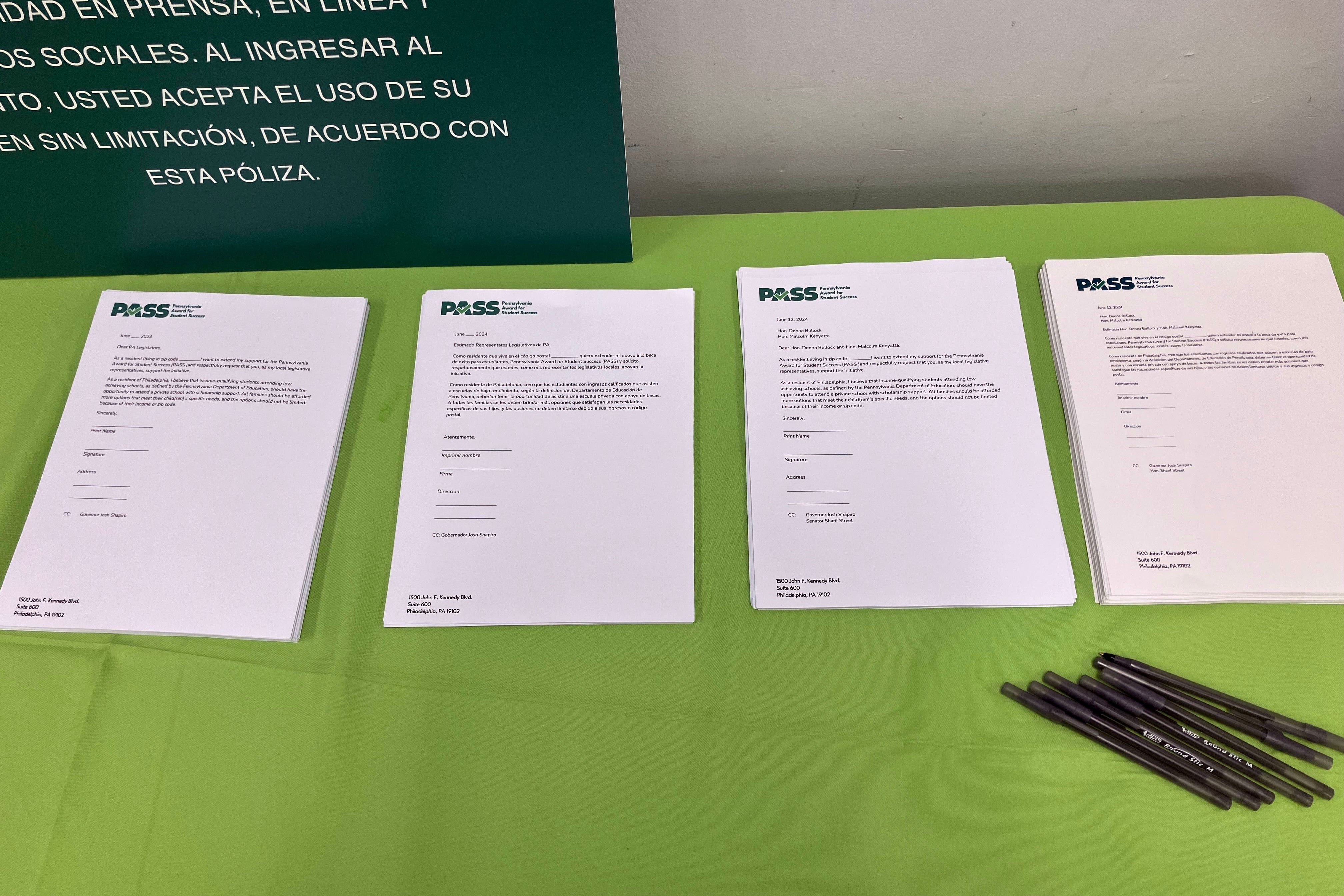Sign up for Chalkbeat Philadelphia’s free newsletter to keep up with the city’s public school system.
Inside Beckett Life Center, a North Philly community center, families on Wednesday gathered around catered sandwiches and salads listening to several young volunteers laud a proposal that would pour millions of state dollars into vouchers to help them escape their underperforming public schools.
It was one of 10 “dine and learn” events this month organized by Team Roc, the philanthropic arm of entertainment mogul Jay-Z’s Roc Nation, as part of the rapper’s high-profile involvement in the polarizing issue. Families were greeted with signage promoting the pending voucher proposal – known as Pennsylvania Award for Student Success or PASS – by name and had access to stacks of form letters to send to lawmakers and Gov. Josh Shapiro in support of the initiative, also known as Senate Bill 757.
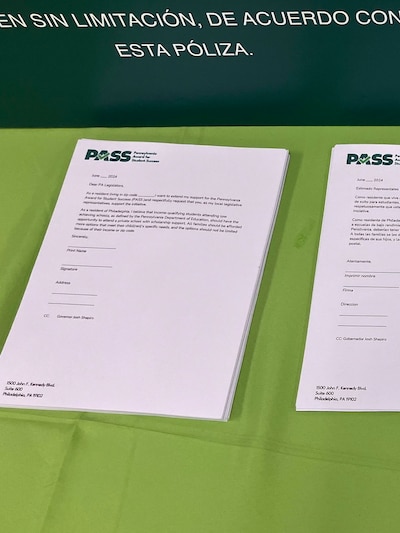
Those details about the “PASS It Forward” events led to questions about the ethics of Team Roc’s efforts and whether they have crossed from activism about school choice generally into lobbying for this legislation specifically.
Roc Nation spokesperson Didier Morais initially told Chalkbeat Thursday that the organization was not a lobbying group but “concerned citizens.” And a search of the public lobbying directory did not list Roc Nation, Team Roc, or Jay-Z as registered lobbyists in the state.
Hours after Chalkbeat published this story, Morais responded saying the organization had registered its lobbying paperwork. A copy of the paperwork showed it had been filed the same day the story published.
An expert told Chalkbeat that the signage and form letters available at the informational events could fall under the “indirect communication” portion of the state’s lobbying law, which describes efforts to encourage the general public to take action to directly influence legislative decisionmaking.
“That is classic lobbying,” Adam Bonin, a lawyer and lobbying law expert said about the form letters and efforts to encourage citizens to contact their legislators. “Entities which are involved in such efforts should register and should disclose their activities.”
Bonin added there’s nothing wrong with lobbying and it’s a protected First Amendment activity. But, he said, “the public has a right to know … how much is being spent on these efforts, what areas the entities are involved in, and in the case of coalitions who are the key funders behind these efforts.”
Hours after Chalkbeat published this story, a spokesperson responded saying the organization had registered its lobbying paperwork. A copy of the paperwork showed it had been filed the same day the story published.
Jeffery Frankenburger, deputy executive director at the Pennsylvania State Ethics Commission, said he couldn’t comment on the specific case, but he did point to a lobbying disclosure manual that provides examples of lobbying through “indirect communication,” which include “communicating with others asking them to contact state officials or employees” and “drafting letters for a letter writing campaign to be sent to various representatives.”
The PASS It Forward PA website, the official website of Team Roc’s campaign which lists all of the events, only makes reference to Team Roc in small font on its “terms and conditions” page. The website also features a “take action” button directing readers to “Call your local house representative and state senator and urge them to vote yes on PASS to make educational options available to those who need it most.”
Morais told Chalkbeat Thursday that “there was no specific bill promotional language at the event nor did anyone sign anything that references a specific bill.” When informed there was signage promoting the PASS scholarship program and blank form letters available for families to sign and send to their legislators urging them to support PASS, Morais said he would need to look into the issue further.
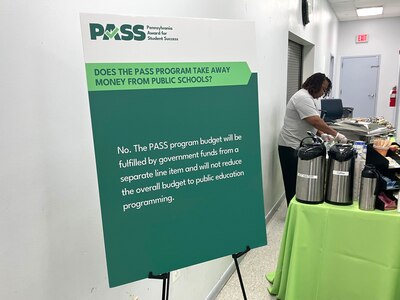
Workers in black “PASS it Forward” t-shirts staffing Wednesday’s event told Chalkbeat they were instructed not to speak to the press. A Team Roc spokesperson told The Philadelphia Inquirer those volunteers were receiving stipends from Roc Nation.
Frankenburger also said lobbying law states “any person who makes an expenditure for indirect communication,” even if they are not a registered lobbyist, must include disclosure language that “clearly and conspicuously states the name of the person who made or financed the expenditure for the communication.” The form letters did not include any such disclosure language or any reference to Roc Nation or Team Roc.
Frankenburger noted individuals or lobbying firms have 10 days from their lobbying activity to register with the state. Roc Nation’s first community event in Philly was June 10, and they first announced their “campaign” to support the initiative on June 7th. According to Team Roc’s lobbying registration, the group’s lobbying activities commenced June 4 — ten days before they filed.
A political tug-of-war with families in the middle
Philadelphia families attending these “dine and learn” events — especially those from low-income backgrounds — are locked in a political tug-of-war over their educational options. High-profile, monied lobbying groups like the Commonwealth Foundation and now Team Roc are ramping up efforts to tell local families how they would benefit from a state taxpayer-funded voucher program that aims to give students the options to leave underperforming public school systems. Pennsylvania’s Democratic Governor Josh Shapiro also has said he supports the effort.
“We must prioritize student-first solutions—programs like [PASS] Scholarships that immediately expand educational freedom for kids in our state’s worst-performing schools,” Commonwealth Foundation Director of Legislative Strategy Kevin Kane said in a statement. “Bipartisan initiatives like these will provide the options families need to find the best educational fit for their children now.”
Lawmakers and advocates across the education spectrum are concerned about Philadelphia’s persistently low standardized test scores but don’t agree on the solution.
Philadelphia politicians including City Council members Kendra Brooks, Isaiah Thomas, Jamie Gauthier, and Nicolas O’Rourke have strongly opposed any type of voucher program. Philadelphia’s city council approved a resolution Thursday condemning private school vouchers as “harmful to the School District of Philadelphia.”
“Vouchers put public money in the pockets of the rich while draining resources from public schools in our communities,” said Brooks in a statement. “Vouchers will not benefit the children in our communities or fix Pennsylvania’s unfair funding system. Instead, they will deepen the economic and racial divides in Pennsylvania’s school system and widen the gap between the rich and the rest of us.”
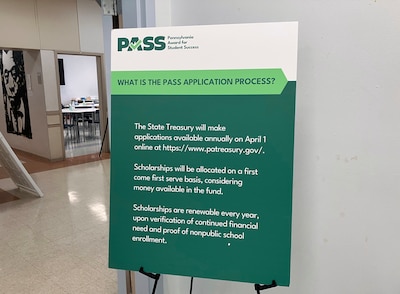
What would the PASS program do?
The PASS program is a voucher program being negotiated as part of the state budget process.
If approved, the PASS program would offer low-income families up to $10,000 in scholarships to attend private schools. To qualify, students must attend a state-designated “low-achieving” school, and their household income must be 250% of the poverty line, which is $75,000 for a family of four.
This bill is not the first of its kind. Arizona, Tennessee, Indiana, and New Jersey are also grappling with voucher legislation.
Public school advocates like Laura Boyce, executive director of Teach Plus Pennsylvania, have said diverting public money to private institutions stands in direct opposition to a recent court ruling that Pennsylvania has been unconstitutionally underfunding its public school system for years.
A well-funded, fairly-resourced public school district would benefit all Philly students and their communities, Boyce said.
Boyce and other voucher opponents also say that unlike public schools, private schools can choose not to admit students based on their special education needs, gender identity or orientation, or academic remediation needs.
Mayor Cherelle Parker and Philadelphia Schools Superintendent Tony Watlington have declined to comment on the voucher proposal.
Monique Braxton, a school district spokesperson said in a statement: “The Pennsylvania public school funding system has inadequately and inequitably funded low-wealth school districts for decades.” She said the district is “continually forced to parse insufficient resources, resources which cannot meet the varying needs of our students and staff.”
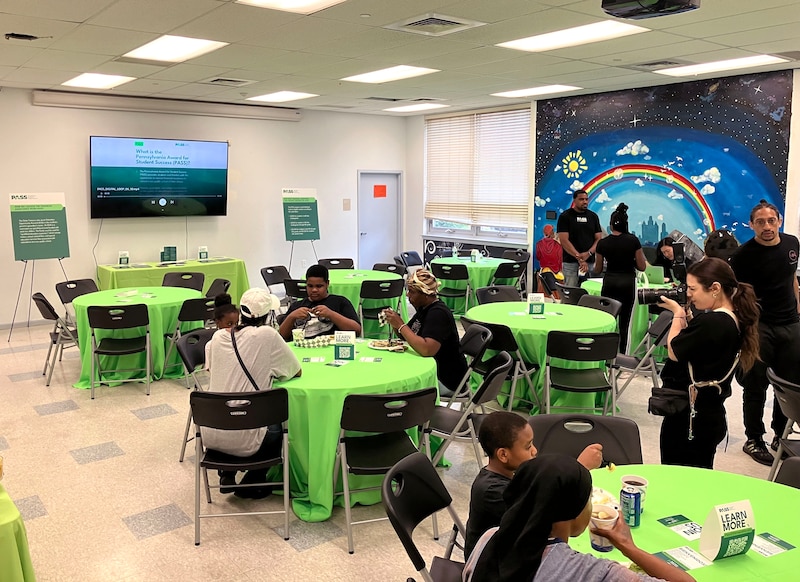
What does voucher research show?
Increasingly, studies of voucher programs nationwide show wealthy families who may have already enrolled their students in private schools are driving much of the demand.
Voucher research more broadly tends to demonstrate low-income students do not boost their test scores from attending private schools. But there is some evidence that shows those who attend private schools are more satisfied with their school cultures and feel safer.
The research in Philly is limited.
The Children’s Scholarship Fund Philadelphia, an advocacy group that provides scholarships for low-income Philly students to attend private, tuition-based schools, published a report this year that shows their students outperformed their public school peers on math and reading standardized tests.
However, their report has some limitations. The report isn’t a direct comparison: For example, the CSFP report compared fourth- and seventh-grade scholarship recipients’ test scores to the scores of all children attending a public school. The private schools also administered different tests than the standardized exams public schools administer, which meant the CFSP data analysts sorted and converted the private school test data into a form that would be comparable to the state’s PSSA test — though not exactly the same.
But for parents like Keyzett Brockington-Ham, mother of three who also attended the Wednesday event, politics comes second to educational opportunities for their children.
“When I saw this I knew this was my time,” said Brockington-Ham about the PASS scholarship event.
Her daughter attends Meade School in North Philly, and her son attends ASPIRA Bilingual Cyber Charter School but Brockington-Ham thinks a private school would be a better option.
“This would be a great opportunity for my children.”
She voiced numerous concerns about her children’s schools like the bullying both experienced as well as little time spent on enrichment like art, music, and gym. Private schools would provide them with more resources they don’t have in the school district, Brockington-Ham said.
Carly Sitrin is the bureau chief for Chalkbeat Philadelphia. Contact Carly at csitrin@chalkbeat.org.
Azia Ross is a summer intern for Chalkbeat Philadelphia. You can reach her at aziaross@chalkbeat.org.

